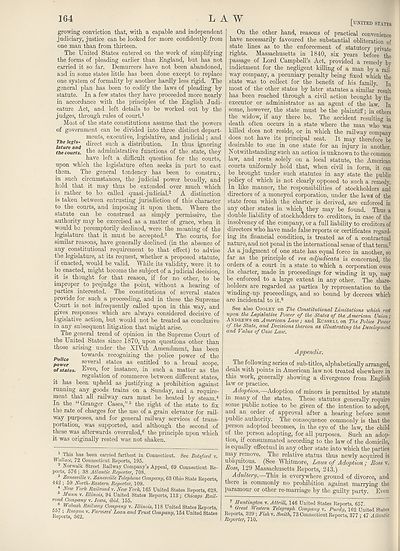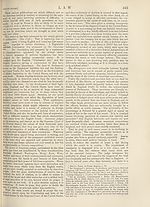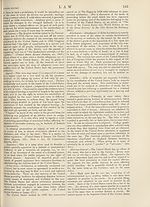New volumes of the Encyclopædia Britannica > Volume 30, K-MOR
(188) Page 164
Download files
Complete book:
Individual page:
Thumbnail gallery: Grid view | List view

164
growing conviction that, with a capable and independent
judiciary, justice can be looked for more confidently from
one man than from thirteen.
The United States entered on the work of simplifying
the forms of pleading earlier than England, but has not
carried it so far. Demurrers have not been abandoned,
and in some states little has been done except to replace
one system of formality by another hardly less rigid. The
general plan has been to codify the laws of pleading by
statute. In a few states they have proceeded more nearly
in accordance with the principles of the English Judi¬
cature Act, and left details to be worked out by the
judges, through rules of court.1
Most of the state constitutions assume that the powers
of government can be divided into three distinct depart¬
ments, executive, legislative, and judicial; and
Jatureand ^irect suc^ a distribution. In thus ignoring
the courts, the administrative functions of the state, they
have left a difficult question for the courts,
upon which the legislature often seeks in part to cast
them. The general tendency has been to construe,
in such circumstances, the judicial power broadly, and
hold that it may thus be extended over much which
is rather to be called quasi-judicial.2 A distinction
is taken between entrusting jurisdiction of this character
to the courts, and imposing it upon them. Where the
statute can be construed as simply permissive, the
authority may be exercised as a matter of grace, when it
would be peremptorily declined, were the meaning of the
legislature that it must be accepted.3 The courts, for
similar reasons, have generally declined (in the absence of
any constitutional requirement to that effect) to advise
the legislature, at its recpest, whether a proposed statute,
if enacted, would be valid. While its validity, were it to
be enacted, might become the subject of a judicial decision,
it is thought for that reason, if for no other, to be
improper to prejudge the point, without a hearing of
parties interested. The constitutions of several states
provide for such a proceeding, and in these the Supreme
Court is not infrequently called upon in this way, and
gives responses which are always considered decisive of
legislative action, but would not be treated as conclusive
in any subsequent litigation that might arise.
The general trend of opinion in the Supreme Court of
the United States since 1870, upon questions other than
those arising under the XIVth Amendment, has been
towards recognizing the police power of the
power several states as entitled to a broad scope.
of states. Even, for instance, in such a matter as the
regulation of commerce between different states,
it has been upheld as justifying a prohibition against
running any goods trains on a Sunday, and a require¬
ment that all railway cars must be heated by steam.4
In the “Granger Cases,”5 the right of the state to fix
the rate of charges for the use of a grain elevator for rail-
way purposes, and for general railway services of trans¬
portation, was supported, and although the second of
these was afterwards overruled,6 the principle upon which
it was originally rested was not shaken.
1 This has been carried farthest in Connecticut. See Botsford v.
Wallace, 72 Connecticut Reports, 195.
2 Norwalk Street Railway Company’s Appeal, 69 Connecticut Re¬
ports, 576 ; 38 Atlantic Reporter, 708.
3 Zanesville v. Zanesville Telephone Company, 63 Ohio State Reports,
442 ; 59 North-Eastern Reporter, 109.
4 New York Railroad v. New York, 165 United States Reports, 628.
Munn v. Illinois, 94 United States Reports, 113 ; Chicago Rail¬
road Company v. Iowa, ibid. 155.
6 Wabash Railway Company v. Illinois, 118 United States Reports,
557 ; Reagan v. Farmers Loan and Trust Company, 154 United States
Reports, 362.
[united STATES
On the other hand, reasons of practical convenience
have necessarily favoured the substantial obliteration of
state lines as to the enforcement of statutory private
rights. Massachusetts in 1840, six years before the
passage of Lord Campbell’s Act, provided a remedy by
indictment for the negligent killing of a man by a rail¬
way company, a pecuniary penalty being fixed which the
state was to collect for the benefit of his family. In
most of the other states by later statutes a similar result
has been reached through a civil action brought hy the
executor or administrator as an agent of the law. In
some, however, the state must be the plaintiff; in others
the widow, if any there be. The accident resulting in
death often occurs in a state where the man who was
killed does not reside, or in which the railway company
does not have its principal seat. It may therefore be
desirable to sue in one state for an injury in another.
Notwithstanding such an action is unknown to the common
law, and rests solely on a local statute, the American
courts uniformly hold that, when civil in form, it can
be brought under such statutes in any state the public
policy of which is not clearly opposed to such a remedy.
In like manner, the responsibilities of stockholders and
directors of a moneyed corporation, under the laws of the
state from which the charter is derived, are enforced in
any other states in which they may be found. Thus a
double liability of stockholders to creditors, in case of the
insolvency of the company, or a full liability to creditors of
directors who have made false reports or certificates regard-
ing its financial condition, is treated as of a contractual
nature, and not penal in the international sense of that term.7
As a judgment of one state has equal force in another, so
far as the principle of res adjudicata is concerned, the
orders of a court in a state to which a corporation owes
its charter, made in proceedings for winding it up, may
be enforced to a large extent in any other. The share¬
holders are regarded as parties by representation to the
winding-up proceedings, and so bound by decrees which
are incidental to it.8
See also Cooley on The Constitutional Limitations which rest
upon the Legislative Power of the States of the American Union;
Andrews on American Law; and Russell on The Police Power
of the State, and Decisions thereon as illustrating the Development
and Value of Case Law.
Appendix.
The following series of sub-titles, alphabetically arranged,
deals with points in American law not treated elsewhere in
this work, generally showing a divergence from English
law or practice.
Adoption, Adoption of minors is permitted by statute
in many of the states. These statutes generally require
some public notice to be given of the intention to adopt,
and an order of approval after a hearing before some
public authority. The consequence commonly is that the
person adopted becomes, in the eye of the law, the child
of the person adopting, for all purposes. Such an adop¬
tion, if consummated according to the law of the domicile,
is equally effectual in any other state into which the parties
may remove. The relative status thus newly acquired is
ubiquitous. (See Whitmore, Laws of Adoption ; Ross v.
Ross, 129 Massachusetts Eeports, 243.)
Adultery. This is everywhere ground of divorce, and
there is commonly no prohibition against marrying the
paramour or other re-marriage by the guilty party. Even
7 Huntington v. Attrill, 146 United States Reports, 657.
8 Great Western Telegraph Company v. Purdy, 162 United States
Reports, 329 ; Fish v. Smith, 73 Connecticut Reports, 377 : 47 Atlantic
I Reporter, 710.
LAW
growing conviction that, with a capable and independent
judiciary, justice can be looked for more confidently from
one man than from thirteen.
The United States entered on the work of simplifying
the forms of pleading earlier than England, but has not
carried it so far. Demurrers have not been abandoned,
and in some states little has been done except to replace
one system of formality by another hardly less rigid. The
general plan has been to codify the laws of pleading by
statute. In a few states they have proceeded more nearly
in accordance with the principles of the English Judi¬
cature Act, and left details to be worked out by the
judges, through rules of court.1
Most of the state constitutions assume that the powers
of government can be divided into three distinct depart¬
ments, executive, legislative, and judicial; and
Jatureand ^irect suc^ a distribution. In thus ignoring
the courts, the administrative functions of the state, they
have left a difficult question for the courts,
upon which the legislature often seeks in part to cast
them. The general tendency has been to construe,
in such circumstances, the judicial power broadly, and
hold that it may thus be extended over much which
is rather to be called quasi-judicial.2 A distinction
is taken between entrusting jurisdiction of this character
to the courts, and imposing it upon them. Where the
statute can be construed as simply permissive, the
authority may be exercised as a matter of grace, when it
would be peremptorily declined, were the meaning of the
legislature that it must be accepted.3 The courts, for
similar reasons, have generally declined (in the absence of
any constitutional requirement to that effect) to advise
the legislature, at its recpest, whether a proposed statute,
if enacted, would be valid. While its validity, were it to
be enacted, might become the subject of a judicial decision,
it is thought for that reason, if for no other, to be
improper to prejudge the point, without a hearing of
parties interested. The constitutions of several states
provide for such a proceeding, and in these the Supreme
Court is not infrequently called upon in this way, and
gives responses which are always considered decisive of
legislative action, but would not be treated as conclusive
in any subsequent litigation that might arise.
The general trend of opinion in the Supreme Court of
the United States since 1870, upon questions other than
those arising under the XIVth Amendment, has been
towards recognizing the police power of the
power several states as entitled to a broad scope.
of states. Even, for instance, in such a matter as the
regulation of commerce between different states,
it has been upheld as justifying a prohibition against
running any goods trains on a Sunday, and a require¬
ment that all railway cars must be heated by steam.4
In the “Granger Cases,”5 the right of the state to fix
the rate of charges for the use of a grain elevator for rail-
way purposes, and for general railway services of trans¬
portation, was supported, and although the second of
these was afterwards overruled,6 the principle upon which
it was originally rested was not shaken.
1 This has been carried farthest in Connecticut. See Botsford v.
Wallace, 72 Connecticut Reports, 195.
2 Norwalk Street Railway Company’s Appeal, 69 Connecticut Re¬
ports, 576 ; 38 Atlantic Reporter, 708.
3 Zanesville v. Zanesville Telephone Company, 63 Ohio State Reports,
442 ; 59 North-Eastern Reporter, 109.
4 New York Railroad v. New York, 165 United States Reports, 628.
Munn v. Illinois, 94 United States Reports, 113 ; Chicago Rail¬
road Company v. Iowa, ibid. 155.
6 Wabash Railway Company v. Illinois, 118 United States Reports,
557 ; Reagan v. Farmers Loan and Trust Company, 154 United States
Reports, 362.
[united STATES
On the other hand, reasons of practical convenience
have necessarily favoured the substantial obliteration of
state lines as to the enforcement of statutory private
rights. Massachusetts in 1840, six years before the
passage of Lord Campbell’s Act, provided a remedy by
indictment for the negligent killing of a man by a rail¬
way company, a pecuniary penalty being fixed which the
state was to collect for the benefit of his family. In
most of the other states by later statutes a similar result
has been reached through a civil action brought hy the
executor or administrator as an agent of the law. In
some, however, the state must be the plaintiff; in others
the widow, if any there be. The accident resulting in
death often occurs in a state where the man who was
killed does not reside, or in which the railway company
does not have its principal seat. It may therefore be
desirable to sue in one state for an injury in another.
Notwithstanding such an action is unknown to the common
law, and rests solely on a local statute, the American
courts uniformly hold that, when civil in form, it can
be brought under such statutes in any state the public
policy of which is not clearly opposed to such a remedy.
In like manner, the responsibilities of stockholders and
directors of a moneyed corporation, under the laws of the
state from which the charter is derived, are enforced in
any other states in which they may be found. Thus a
double liability of stockholders to creditors, in case of the
insolvency of the company, or a full liability to creditors of
directors who have made false reports or certificates regard-
ing its financial condition, is treated as of a contractual
nature, and not penal in the international sense of that term.7
As a judgment of one state has equal force in another, so
far as the principle of res adjudicata is concerned, the
orders of a court in a state to which a corporation owes
its charter, made in proceedings for winding it up, may
be enforced to a large extent in any other. The share¬
holders are regarded as parties by representation to the
winding-up proceedings, and so bound by decrees which
are incidental to it.8
See also Cooley on The Constitutional Limitations which rest
upon the Legislative Power of the States of the American Union;
Andrews on American Law; and Russell on The Police Power
of the State, and Decisions thereon as illustrating the Development
and Value of Case Law.
Appendix.
The following series of sub-titles, alphabetically arranged,
deals with points in American law not treated elsewhere in
this work, generally showing a divergence from English
law or practice.
Adoption, Adoption of minors is permitted by statute
in many of the states. These statutes generally require
some public notice to be given of the intention to adopt,
and an order of approval after a hearing before some
public authority. The consequence commonly is that the
person adopted becomes, in the eye of the law, the child
of the person adopting, for all purposes. Such an adop¬
tion, if consummated according to the law of the domicile,
is equally effectual in any other state into which the parties
may remove. The relative status thus newly acquired is
ubiquitous. (See Whitmore, Laws of Adoption ; Ross v.
Ross, 129 Massachusetts Eeports, 243.)
Adultery. This is everywhere ground of divorce, and
there is commonly no prohibition against marrying the
paramour or other re-marriage by the guilty party. Even
7 Huntington v. Attrill, 146 United States Reports, 657.
8 Great Western Telegraph Company v. Purdy, 162 United States
Reports, 329 ; Fish v. Smith, 73 Connecticut Reports, 377 : 47 Atlantic
I Reporter, 710.
LAW
Set display mode to:
![]() Universal Viewer |
Universal Viewer | ![]() Mirador |
Large image | Transcription
Mirador |
Large image | Transcription
Images and transcriptions on this page, including medium image downloads, may be used under the Creative Commons Attribution 4.0 International Licence unless otherwise stated. ![]()
| Encyclopaedia Britannica > New volumes of the Encyclopædia Britannica > Volume 30, K-MOR > (188) Page 164 |
|---|
| Permanent URL | https://digital.nls.uk/193569945 |
|---|
| Attribution and copyright: |
|
|---|---|
| Shelfmark | EB.18 |
|---|---|
| Description | Ten editions of 'Encyclopaedia Britannica', issued from 1768-1903, in 231 volumes. Originally issued in 100 weekly parts (3 volumes) between 1768 and 1771 by publishers: Colin Macfarquhar and Andrew Bell (Edinburgh); editor: William Smellie: engraver: Andrew Bell. Expanded editions in the 19th century featured more volumes and contributions from leading experts in their fields. Managed and published in Edinburgh up to the 9th edition (25 volumes, from 1875-1889); the 10th edition (1902-1903) re-issued the 9th edition, with 11 supplementary volumes. |
|---|---|
| Additional NLS resources: |
|

